Central Texas Mycology Spawns a Network of Mushroom Enthusiasts
By Krissi Reeves
Reporting Texas
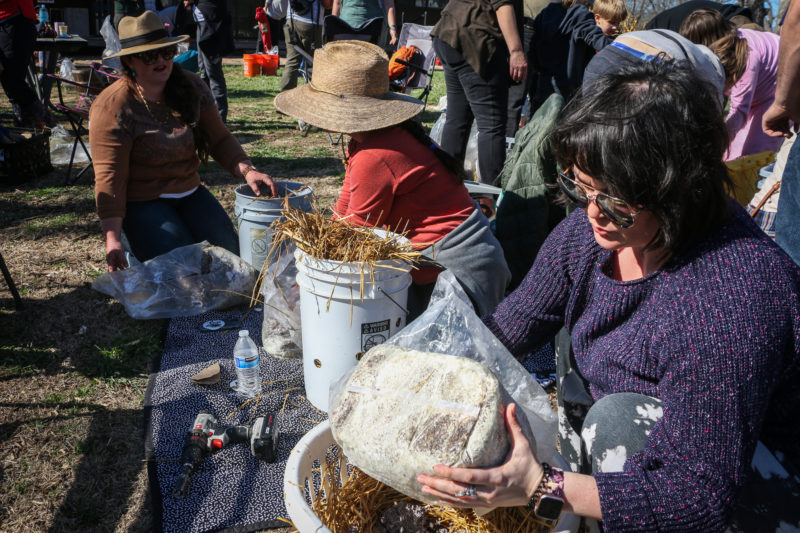
Jessi Cape breaks down and adds her mycelium block to a recycled laundry basket filled with straw, which acts as a substrate for the mycelium to feed and grow off of, during the Lo-tek Mushroom Cultivation workshop at The Long Time event space in East Austin, Texas, on Feb. 13, 2022. Adam Shellooe/Reporting Texas
On an abundantly sunny Sunday afternoon in February, an estimated 100 people spilled onto the outfield of a charming baseball field in far East Austin. They were outfitted with a motley collection of empty vessels — abandoned laundry baskets, orange Home Depot buckets and plastic milk crates.
The cheerful and mostly behatted crowd spread out on the manicured lawn and watched as leaders of the Central Texas Mycology Society reveled in sharing a slew of fungi facts and mushroom-growing demonstrations from an amplified stage. Mycology, in simple terms, is the scientific study of fungi.
The three-member team performed a cheeky interpretive dance showcasing the lifecycle of a mushroom and, for the grand finale, showcased a captivating rabbit-from-a-hat-like harvesting hack involving a retired Danielle Steele novel immersed in a water-filled pressure cooker and then stuffed with mushroom spores — proving that the ever-resilient fungi can grow in almost anything.
Then the eager crowd got to work — filling their vessels with straw and mixing it with recycled mycelium, or the root system of mushrooms. In a few short weeks, edible mushrooms should sprout.
“These will probably end up (being eaten) on Taco Tuesday,” said Buda resident Phil Levinson referring to his container of freshly planted oyster mushrooms.
Levison attended the event with his children, Olivia, 9, and Penny, 4.
“They are at a good age where the curiosity is really high and anything like this is really good for them,” Levinson said. “They can get their hands dirty and be outside all day … and eventually, get to see the fruit of their labor.”
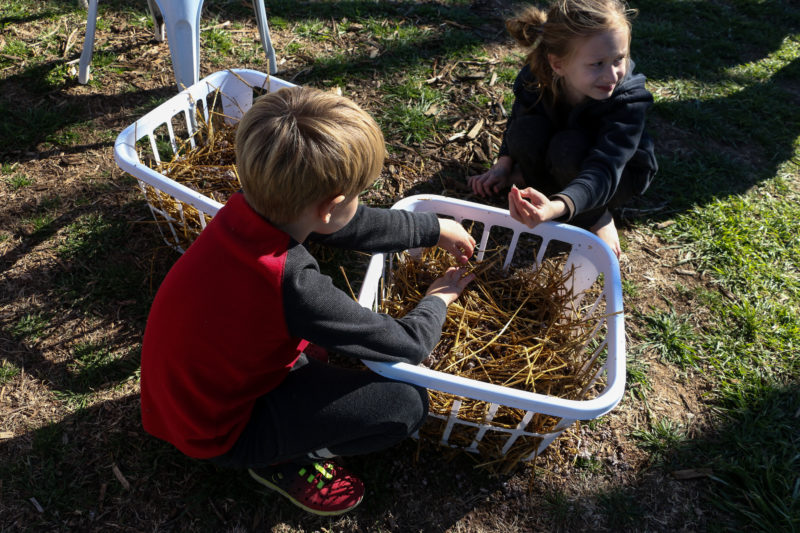
Two children break down mycelium blocks and add them to laundry baskets full of straw substrate. Their mother, Hillarie Roerig, loves cooking with fungi and learned of the Central Texas Mycology Society through word of mouth at her local farmers market. Adam Shellooe/Reporting Texas
This is exactly how the Central Texas Mycology Society’s mushroom block program is supposed to work: teaching people how to easily grow mushrooms at home and consequently serving as a gateway to the complex world of fungi — or, as it is lovingly referred to in this community, the mushroom queendom.
More Central Texans are joining the society. The club has grown from 25 members in early 2020 to more than 600, said Angel Schatz, Central Texas Mycology education and program leader.
“Our primary goal is education. Secondarily, we want to support the mycology community,” Schatz said. “We want people to realize that we would not be here unless fungi did all the work helping us become a networked planet.”
Collectively, mycelium creates a vast underground network of stretching, sinewy threads working together to help plants share resources such as water, nitrogen and other vital minerals. And if conditions are right, mycelium fruits mushrooms.
In a distinctly similar way to mycelia, the small, savvy team behind Central Texas Mycology Society has built a vast and growing network of enthusiastic volunteers to help distribute the mushroom blocks across Central Texas. Their distribution points stretch from Georgetown to New Braunfels and Bastrop to Cedar Park.
Since giving away their first mushroom block during the winter storm of February 2020, Schatz estimates they have distributed 50,000 mushroom blocks, which have been donated from local mushroom farms. They’ve also set up a dozen public stations throughout Central Texas where people can pick up blocks in exchange for a donation. People then scan a QR code that takes them to a video series on how to grow mushrooms from the blocks, which are generally composed of mycelium and sawdust.
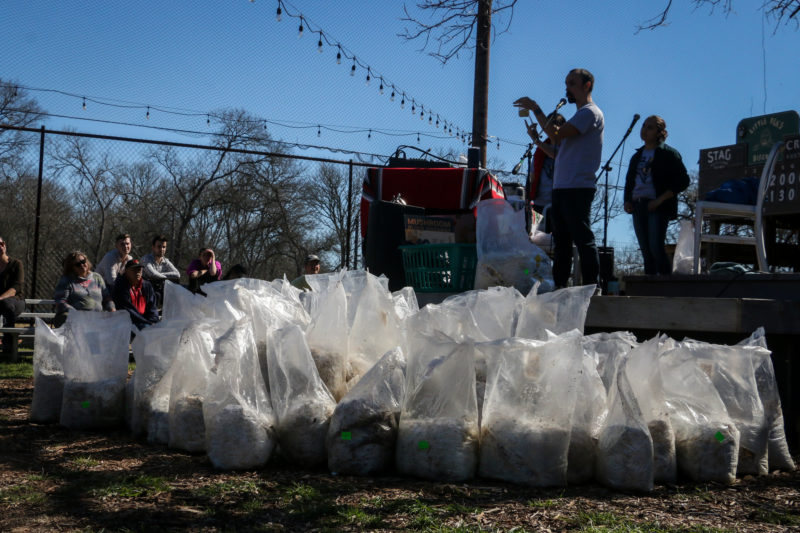
Shonnon Gourley discusses the properties of mycelium liquid culture before distributing recycled mycelium blocks to attendees of the Lo-tek Mushroom Cultivation workshop at The Long Time event space in East Austin, Texas, on Feb. 13, 2022. Adam Shellooe/Reporting Texas
Sonia Koschoreck, a Texas master naturalist and Pflugerville resident, discovered Central Texas Mycology through her study of monarch butterfly conservation. Native milkweed (the monarch’s main source of food) has a symbiotic relationship with fungi.
“The more I learned (about mushrooms), the more I was like, they do everything!” Koschoreck said. “They’re saving the world, they’re cleaning up our environment, they provide us food and medicine and help our plants grow.”
Now Koschoreck is growing mushrooms in her front yard, back yard and garage. Her goal is to give away 300 mushroom blocks a month in the Williamson County area.
In addition to its fungi-focused in-person workshops and catalog of self-made educational videos, the mycology society in 2021 played a pivotal role in helping to pass legislation designating the Texas Star, also known as the Devil’s Cigar or chorioactis geaster, as the official mushroom of Texas. Oregon and Minnesota are the only other states with an official state fungus.
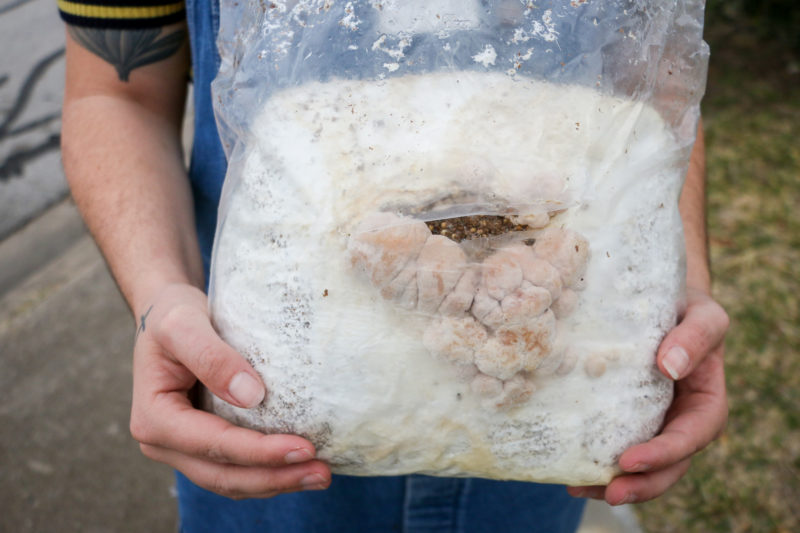
Elise Dole holds a fruiting mycelium block after picking it up from the mycelium block pick up site at Angel Schatz’s home in East Austin, Texas. Adam Shellooe/Reporting Texas
On March 10, the Central Texas Mycology Society announced it will partner with the University of Texas at Austin to create a fungarium — a collection of preserved fungi specimens native to the region.
“There have been very few studies of fungi within Texas despite the rich and diverse ecoregions we have here,” said Liz Bowman, a mycologist, fungal ecologist and postdoctoral researcher at UT’s Brackenridge Field Laboratory.
With the announcement of the fungarium, Schatz and Bowman are hoping to tap into Central Texas Mycology’s growing colony of mushroom enthusiasts to train them as citizen field mycologists who can help collect specimens.
“With this project, we aim to provide training to anyone interested on how to collect, identify and preserve fungi for long-term storage and ultimately, how to use these resources to answer questions of their own,” Bowman said.
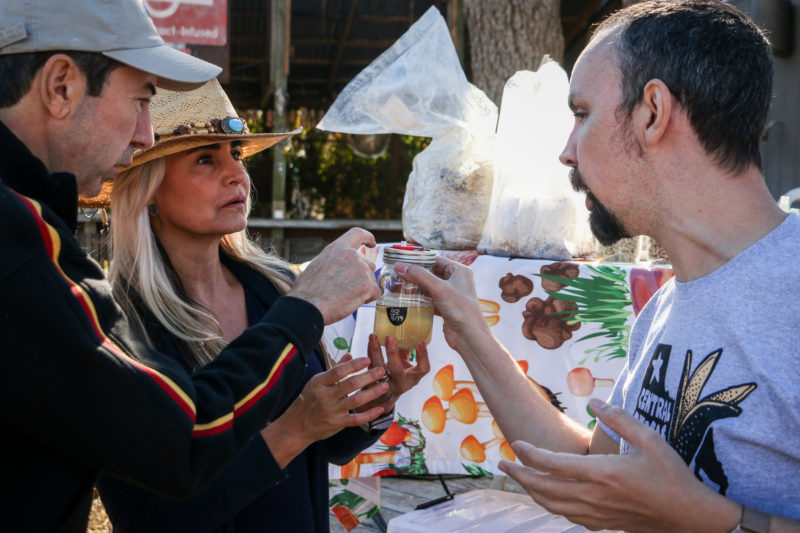
Shonnon Gourley, right, discusses the uses of a premixed solution of malt sugar and mycelium liquid culture with Peter and Emma Palmieri, new members of the Central Texas Mycological Society. Adam Shellooe/Reporting Texas
Through programs like these, Central Texas Mycology also hopes to combat mycophobia — the irrational fear of fungi — and the stigma surrounding illegal psychedelic mushrooms.
Psilocybin and psilocin, the psychoactive compounds found in some strains of mushrooms, were declared illegal in 1968 and classified as a Schedule I Narcotic — along with drugs such as heroin and LSD — in 1970. This criminalization significantly slowed research.
But the stigma around psychedelic mushrooms is changing. In 2018, the FDA declared psilocybin a breakthrough therapy — fast-tracking it as a potential treatment for depression and PTSD. Dozens of cities, including Denver, Seattle and Washington D.C., have taken measures to decriminalize psychedelic mushrooms. And this past December, UT’s Dell Medical School announced the formation of its own Center for Psychedelic Research and Therapy.
The fungarium’s new DNA sequencing program hopes to further the research of fungi’s medicinal, technological and ecological purposes and shine light on the versatility of mushrooms.
In the meantime, Central Texas Mycology will continue to cultivate the next generation of mycology enthusiasts.
And, as many people pointed out at the mushroom growing workshop, there’s a significant bonus to learning how to cultivate mushrooms — you get to eat them.
“All of it seems magical to me,” Schatz said.